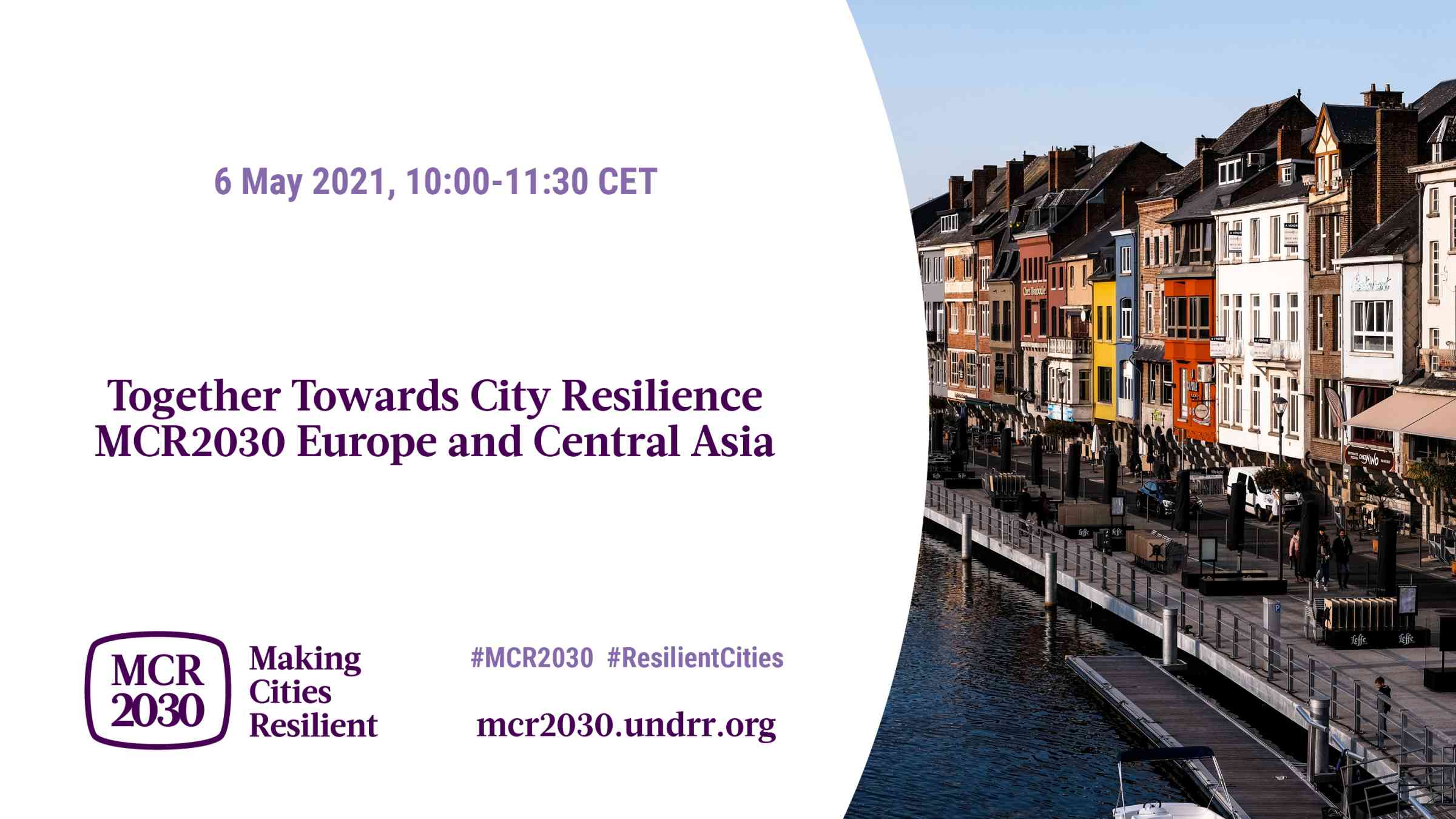Making Cities Resilient 2030 initiative launched in Europe and Central Asia

Brussels – On 6 May, the regional online event “Together Towards City Resilience”, co-organized by the UNDRR Regional Office for Europe and ICLEI Europe, marked the launch of the Making Cities Resilient 2030 (MCR2030) initiative in the Europe and Central Asia region.
Opening the event, Ms. Mami Mizutori, Special Representative of the Secretary-General for Disaster Risk Reduction, highlighted that MCR2030 “will give a major boost to our efforts to increase the number of local strategies for disaster risk reduction across Europe and Central Asia”. She further stressed the importance of international cooperation to building sustainable resilient future for cities.
Mr. Wolfgang Teubner, ICLEI Regional Director, welcomed the initiative saying that ICLEI is proud to be co-chairing the initiative and shaping a regional approach that will make the initiative relevant, practical and beneficial for cities in Europe and Central Asia.
The panel discussion included speakers representing five European cities – members of the MCR2030 Initiative and was moderated by Ms. Karin Klasa, the National Focal Point for the Sendai Framework from the Swedish Civil Contingencies Agency and member of the MCR2030 Regional Coordination Committee for Europe and Central Asia.
Mr. Ion Cheban, the General Mayor of Chisinau – the first city to join MCR2030 in the region, said that no city can deal alone with shocks and disasters. He further added that for Chisinau one of the main priorities within MCR2030 is coordinated resilience investment.
Ms. Sanja Jerković, Head of Office for Strategic Planning and Development, Zagreb shared the experience of her city responding to an earthquake whilst in the middle of a pandemic, demonstrating the value of risk data and risk knowledge to inform resilience measures at city level. This multi-hazard risk management experience taught the city that they would need clear frameworks and protocols and updated data on buildings to estimate damage and earthquake impacts.
Mr. Zdravko Maksimovic, the Head of the Civil Protection Department, Kraljevo highlighted the importance of peer learning and cooperation among cities and communities.
“We need cooperation between cities to reach a more sustainable future. The creation of a Barcelona Resilient Hub will help this need of cooperation and will put together best practices from the public sector, private firms, research centres and civil society that will help implementing a bold and vast dimension of resilience in our cities, a key element to reach the 2030 Agenda,” stressed Mr. Miquel Rodríguez, Commissioner for the 2030 Agenda, Barcelona.
Ms. Kathy Oldham, Chief Resilience Officer, representing Greater Manchester emphasised the importance of the MCR network. She further noted that the approaches of MCR can help to bridge silos across the city system, draw a wider range of partners into discussions about resilience and can assist in putting resilience on the top table of the city region’s considerations.
The session concluded with the remarks from Mr. Mazur, Vice-Mayor of Wroclaw, who mentioned ‘it is important to link work done in cities in Europe and Central Asia, as global challenges, such as the covid-19 virus outbreak, need local responses. For resilience work to be beneficial for cities it is important to secure political commitment, therefore participation in relevant networks and initiatives is important for cities that need structural approach to shape up their disaster risk reduction and resilience strategies.’ The webinar was closed by UNDRRR ROE Chief, Octavian Bivol, who stressed that “we can only accomplish what we are aiming for if we work together – and that is what MCR2030 is about – working together with cities and partners towards city resilience”.
Background information:
The MCR2030 initiative serves as a platform facilitating peer-to-peer learning between actors and cities to boost resilience at the local level. Global crises such as the COVID-19 pandemic and climate change reveal the systemic nature of disasters and local governments are key to accelerating action on resilience. In Europe and Central Asia region 23 cities are already engaging as members of the initiative, which was launched in January 2021.
The session included interpretation into Russian language, courtesy of the “Strengthening disaster resilience and accelerating the implementation of Sendai Framework for Disaster Risk Reduction in Central Asia” initiative funded by the European Commission.
For more information, please contact:
Ms. Helena Monteiro, MCR2030 Coordination and Project Support Specialist at mcr2030-europe@un.org.
The recording of the webinar as well as other background materials are available on the event page on the UNDRR ROE website.
Explore further
Is this page useful?
Yes No Report an issue on this pageThank you. If you have 2 minutes, we would benefit from additional feedback (link opens in a new window).